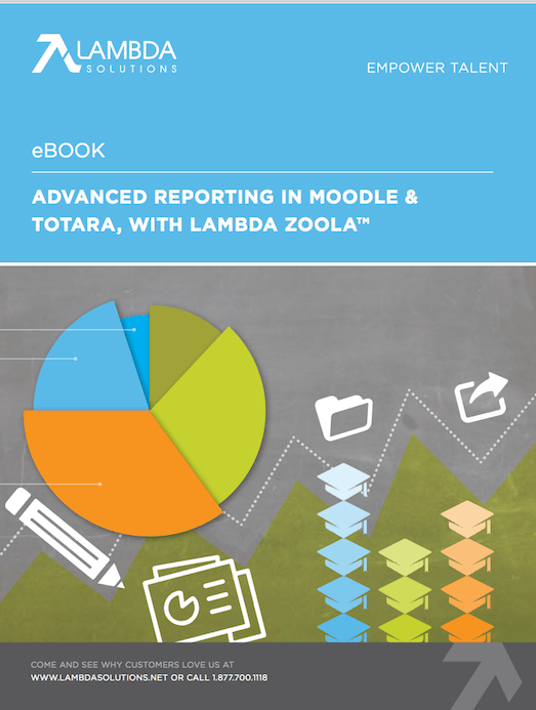The Ethical Concerns With Learning Analytics
Many companies are using learning analytics to track and understand learners’ behaviors, but they aren’t considering the ethical implications that they raise. The amount of personal data that’s available through your Learning Management System is unprecedented, and online learning experts are still wading through all of the issues involved in handling and managing the data.

As a result, there are no established ethical standards that companies are required to follow - which means each organization must carefully consider how they will use students’ personal information, who will have access, and what will be communicated to learners.
As one review article [1] puts it,
Once the Pandora’s Box of data availability has been opened, then individuals lose control of the data about them that have been harvested. They are unable to specify who has access to the data, and for what purpose, and may not be confident that the changes to the education system which result from learning analytics will be desirable....The transport of data from one context to another can result in an unfair and unjustified discrimination against an individual.
Businesses have always collected information about employees, so why should this be any different? Traditionally, employee data has included address, pay rate, and basic demographics. But the details that LMS learning analytics make available are on another level:
- Data comes from different sources and different locations.
- Every button click is captured.
- LA use automated analysis and predictive scoring.
The issues that LA open up are new and multifaceted. If you’re using online learning at your company and capturing student data, you need to be certain that the information is handled ethically.
What Are The Ethical Concerns With Learning Analytics?
The practical challenge of learning analytics is the question of privacy of the learner. Questions abound:
- Who has access to the learner’s data?
- To what degree do you need to inform LMS users that their data is being collected?
- Do you need learners’ permission to use their data?
- Where should the data be stored? How secure does it need to be?
- Who owns individuals’ data?
- What about misinterpretation of data, or other data errors?
- Is there an ethical obligation to act in response to data that we have?
Let’s explore each of these questions briefly.
1. Data Access
Who has access to the data that’s collected? Should administrators or course designers have the same access that instructors have? Should instructors have access to all of the data, or just some of it?
If your learners are geographically scattered, it might be helpful to know what city they live in - but that doesn’t mean instructors should know students’ street addresses. Other sensitive information should probably be off-limits as well: Credit cards (if courses are paid for), SSN, passwords, etc.
2. Transparency
How much should you disclose to students about the information that’s collected, and how it will be used? Most students realize that some amount of their information is being collected, monitored, and analyzed. It’s a ubiquitous online experience in today’s internet culture. But chances are, your learners aren’t aware how much you’re using their data- especially in an educational or training setting [2].
3. Consent
What kind of consent should you ask students to give? Can you use some (or all) of their data without consent? Should you allow students to be anonymous online? There’s general consensus that you’re ethically obligated to get some kind of student sign-off, but there isn’t an agreed-upon standard of what the sign-off should include.
4. Location And Security
Where should student data be stored? Most organizations don’t control the storage, location, or security of the data that’s collected. Often, data is housed not just outside of the institution, but outside of the country. Certain security and privacy laws may not apply in the country where the data is located - which means your learners’ data could potentially be used or sold without their permission.
5. Data Ownership
Who has the right to determine how the data is used? Can personal information or learners’ online activities be used for unrelated purposes, such as research or marketing? Can students control how their data is used? How long should the data be kept before it’s deleted?
6. Misinterpretation
Learning analytics often rely heavily on interpreting data and connecting the dots. That means instructors need to rely on intuition and assumptions at times. It’s entirely possible to misinterpret the data or see patterns that aren’t really there. What are the implications for responsibility and liability in the case of misinterpretation, or inaccurate information?
7. Obligation To Act
Some learning experts believe that we are ethically obligated to act once we have information. But it could be argued that not every piece of action requires action. What data obligates action, and what data doesn’t? Do we really have a responsibility to act on data?
Any organization that collects student data for learning analytics must address these questions. The implications can be dizzying for many companies, but you don’t have to feel your way through the issues on your own. Here are some helpful guidelines for developing an ethical approach to learning analytics.
4 Ways To Protect Learners’ Privacy
What steps need to be taken to protect learners? Follow these guidelines as a starting point for your company’s code of practice for learning analytics.
1. Define The Scope And Purpose
You must have a defined understanding of what data will be collected, how it will be used, and for what purpose. By establishing the scope and purpose of your learning analytics, you set ethical boundaries that you can explain and defend when learners have questions about how their information is used.
2. Be Transparent And Get Consent
Provide learners with documentation that clearly describes the processes involved in data collection and analysis. Explain how the data will be used, and why - and how it won’t be used.
Get consent from each student before any data is collected. However, there may be legal circumstances where students aren’t permitted to opt out—if so, be clear about these scenarios.
3. Protect Privacy
Restrict access to student data. Not everyone who has access needs complete access - only give staff and administrators the kind of permissions that they need to have. Whenever possible, make learner data anonymous.
Also be sure that student information is protected when contracting with third parties for data storage and analysis.
4. Enable Positive Interventions
You’re collecting data for a reason - to help students succeed. Establish clear guidelines that delineate how and when instructors should intervene to help struggling learners. Specify the type and nature of interventions, and who should carry them out. Also, communicate the learners’ responsibilities for self-intervention when feedback data is presented to them.
Are You Ethically Prepared?
Learning analytics can open up a Pandora’s box of ethical issues that you’ll need to be prepared for. And while there’s still much discussion in the online learning industry about what exactly your ethical obligations are, you can establish a basic code of practice that protects both your company and your learners from abuse of information.
Ready to go deeper in your LMS mastery? Check out our upcoming webinars!
References
- Examining ethical and privacy issues surrounding learning analytics
- Learning Analytics: Ethical Issues and Dilemmas
- Code of practice for learning analytics
Related Articles:
- Free eBook: Advanced Reporting In Moodle & Totara, With Zoola Analytics
- 3 Tips To Turn Learning Analytics Into Actionable Outcomes
- What Sources Of Learning Analytics Should You Be Collecting?
- The Importance Of Learning Analytics In Instructional Design
- Learning Metrics That Matter: Data Points You Should Be Measuring








